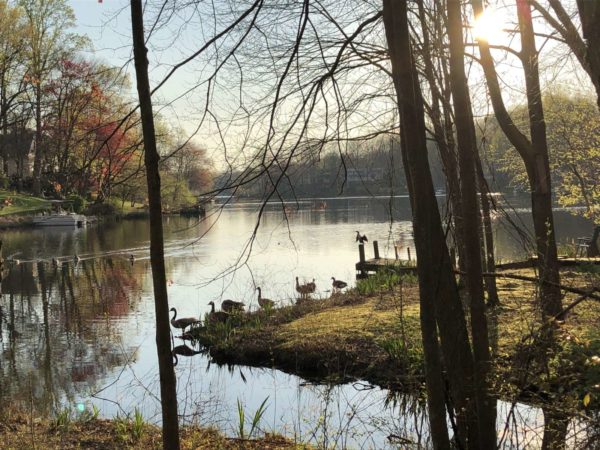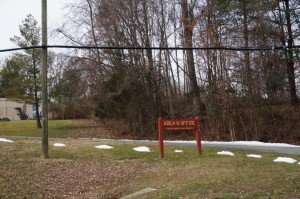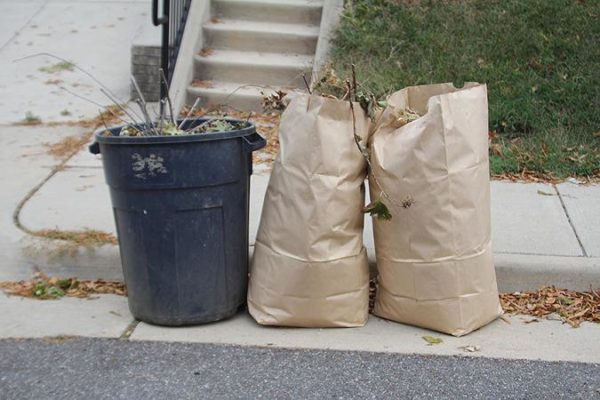 This is an opinion column by Del. Ken Plum (D), who represents Reston in Virginia’s House of Delegates. It does not reflect the opinion of Reston Now.
This is an opinion column by Del. Ken Plum (D), who represents Reston in Virginia’s House of Delegates. It does not reflect the opinion of Reston Now.
As a child of frugal parents who grew up during the Great Depression, I was always taught as long as I did not waste food or material things that I would never be without. “Waste not, want not” was an oft-heard slogan around our house. I carried my lunch to school in a brown paper bag that was recycled from our grocery store purchases, and my peanut butter and jelly sandwich was wrapped in wax paper. After lunch I would fold up the wax paper inside the bag and carry it home in my back pocket for use the next day. I could generally go an entire week without the need for another bag or more wax paper.
Needless to say, I feel a high level of discomfort with our current throw-away society. Not only do we consume ever-increasing levels of natural resources, but we create mountains of waste and the resulting degradation of our environment. Nowhere is the problem more evident than with plastic products. My paper bag and wax paper have been replaced with plastic bags for chips, a plastic container for fruit or dessert, a plastic sandwich wrapper and a drink in a plastic bottle. The manufacturer’s ability to find new uses and the public’s willingness to accept them seem unlimited
A two-year research project by the Pew Charitable Trusts and SYSTEMIQ, Ltd., a London-based environmental think tank, estimates that by 2040 the amount of plastic trash that flows into the oceans every year will triple to 29 million metric tons. Its report “Breaking the Plastic Wave” lists challenging actions that need to be taken to reverse this dangerous threat to our environment. (www.pewtrusts.org, July 2020). The Report was peer reviewed and presented in the journal Science (science.sciencemag.org, July 2020).
The report calls for a wholesale remaking of the global plastics industry by shifting to a circular economy that reuses and recycles plastics. It discusses ten critical findings “showing that a path forward to a low plastic pollution future already exists–now we have to make the choice to walk this path.” The Virginia General Assembly took two steps on the pathway to reduce plastic pollution.
A bill on which I was a co-patron passed and which the Governor has now signed into law prohibits the use of expanded polystyrene food containers, the white foam containers that break into endless number of pieces and litter our beaches and roadsides. The legislature also passed a bill designating advanced recycling as a manufacturing process that must follow all federal and state environmental regulations and laws and a budget amendment I introduced to require the Department of Environmental Quality to monitor the newly-emerging industry. Governor Northam recently signed a new executive order that will decrease plastic pollution and reduce the amount of solid waste going to landfills by phasing out single-use plastics at state agencies.
Clearly the General Assembly must take more aggressive actions in the future to reduce the use of plastics, provide for their reuse or recycling, and recognize that multiple strategies must be taken if the challenges that the Pew study identified are to be addressed. Citizens can join in taking voluntary actions to make choices in the marketplace of alternatives to plastics. Returning to a paper lunch bag or reusable container is a good idea, but the reuse of wax paper is not recommended!
Trash collectors in Fairfax County will not pick up leaves, grass clippings, and other yard waste stored in plastic bags when the collection season begins on Monday (Mar. 1).
After holding a public hearing, the Fairfax County Board of Supervisors voted 9-1 on Tuesday (Feb. 23) to officially prohibit the use of plastic bags for yard waste by amending its Solid Waste Management Ordinance, a move that supporters say is necessary to reduce pollution and make the county more environmentally friendly.
“To reverse climate catastrophe, each of us must make many small and large steps,” Faith Alliance for Climate SolutionsBoard Chair Eric Goplerud said when testifying at the public hearing. “Banning plastic bags to contain yard waste is a step that the Board of Supervisors can take to lead our community to care for our common home, the Earth.”
Fairfax County began transitioning away from using plastic bags for yard waste last year, encouraging residents to use compostable paper bags or reusable containers instead.
In an update to the board’s environmental committee on Oct. 27, county staff reported that about 51% of homes surveyed during the 2020 yard waste season were still utilizing plastic bags, but Fairfax County Director of Engineering and Environmental Compliance Eric Forbes says he is “hopeful and confident” that the bags can be eliminated after the past year of education and outreach.
Now that the ban has been approved, the county’s solid waste management program is encouraging private trash and recycling collection companies to notify their customers that waste in plastic bags will no longer be collected.
“We do not anticipate a hundred percent success rate in the beginning, but we will continue our outreach and collaboration with industry to help our community to reach compliance with the new requirements,” Forbes said.
Forbes acknowledged that compostable paper bags are slightly more expensive to buy than plastic bags. County staff found that paper bags designed to carry yard waste cost about 50 cents per bag, whereas plastic bags cost around 30 cents.
Yet, the overall cost of utilizing plastic may be greater, since the material is difficult to extract and can damage equipment during the composting process, pushing up costs for collectors and, by extension, customers, Board of Supervisors Chairman Jeff McKay says.
While paper bags are preferable to plastic, Forbes noted that residents can avoid the costs of yard waste removal altogether by managing it on-site with backyard composting or allowing grass clippings to decompose on their lawn, a practice known as grasscycling.
McKay says he got 75 emails on the proposed ban, with an even split between supporters and opponents, but he believes it is time for Fairfax County to join the rest of the D.C. region, where some jurisdictions have required paper bags or reusable containers for more than a decade.
“We ultimately just have to decide whether we think this is a good idea or not,” McKay said. “…I think clearly, based on the testimony that we’ve heard today, based on where everyone around the region is, and frankly, based on where the science is, this is something that we must do now to help with our environmental challenges.”
Photo via Fairfax County Government

Alcorn to Host Virtual Budget Town Hall Today — Hunter Mill District Supervisor Walter Alcorn is hosting a town hall today form 7-9 p.m. on the updated budget. Christina Jackson, the county’s budget director, will join Alcorn during the meeting via Crowdcast. [Crowdcast]
Fairfax Connector Scales Back Service — The county’s transportation department is reducing service on several routes due to reduced ridership. Changes will go into effect on Saturday, April 11. [Fairfax County Government]
Hold on to Your Yard Waste — The county is strongly discouraging from taking their yard waste to the I-66 Transfer Station or I-95 Landfill in order to allow employees to focus on collecting trash and encouraging social distancing. [Fairfax County Government]
New Grocery Store Changes — Harris Teeter and Giant will limit the number of shoppers in their stores. Giant is also implementing one-way aisles. [Washington Business Journal, WTOP]
Photo by Marjorie Copson
 Fairfax County is considering relocating one of its two county septage receiving sites from Colvin Run in Great Falls to the Lake Fairfax Park Maintenance Area 6 on Hunter Mill Road in Reston/Vienna.
Fairfax County is considering relocating one of its two county septage receiving sites from Colvin Run in Great Falls to the Lake Fairfax Park Maintenance Area 6 on Hunter Mill Road in Reston/Vienna.
There are 21,000 homes in this area of the county, mostly in Great Falls and Oakton, whose septic tanks must be emptied into a sewer line once every five years (or about 6,000 visits to the current site annually). The current location also receives regular deliveries of restaurant grease.
Officials said the current site floods, smells and has a pipe that is too small to receive the sewage. After looking at six area locations, they determined the Lake Fairfax one is the most appropriate place to built a new, secure, odor-controlled facility. That land is on park land, but not in an area of the park accessible to visitors.
However, Hunter Mill-area residents said at a recent meeting that Hunter Mill is the exact wrong place to build the sewage dump. Among the issues: Two-lane Hunter Mill Road, and its one-lane bridge, cannot handle the increased traffic; the Lake Fairfax site is close to trails and streams; and the sewage should stay closer to its customers in Great Falls.
A report prepared by an environmental consulting firm said, among other things, it would cost more than $700,000 less to renovate the Colvin Run site rather than build a new plant at a cost of $3.4 million.
Where do you think the septage site should be?
Photo: Proposed site of new facility on Hunter Mill Road


